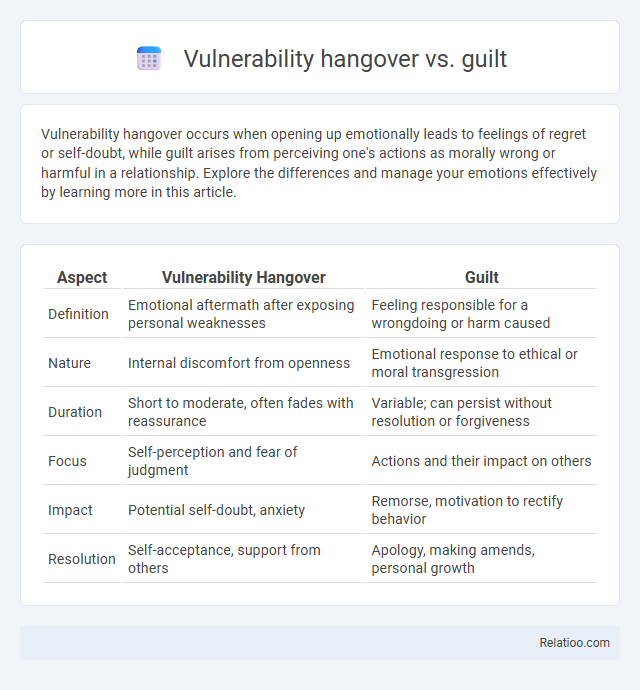Vulnerability hangover occurs when opening up emotionally leads to feelings of regret or self-doubt, while guilt arises from perceiving one's actions as morally wrong or harmful in a relationship. Explore the differences and manage your emotions effectively by learning more in this article.
Table of Comparison
| Aspect | Vulnerability Hangover | Guilt |
|---|---|---|
| Definition | Emotional aftermath after exposing personal weaknesses | Feeling responsible for a wrongdoing or harm caused |
| Nature | Internal discomfort from openness | Emotional response to ethical or moral transgression |
| Duration | Short to moderate, often fades with reassurance | Variable; can persist without resolution or forgiveness |
| Focus | Self-perception and fear of judgment | Actions and their impact on others |
| Impact | Potential self-doubt, anxiety | Remorse, motivation to rectify behavior |
| Resolution | Self-acceptance, support from others | Apology, making amends, personal growth |
Understanding Vulnerability Hangover
Understanding vulnerability hangover involves recognizing the emotional exhaustion and self-doubt that follow exposing one's deepest feelings or insecurities. Unlike guilt, which stems from moral judgment over specific actions, vulnerability hangover reflects the overwhelming fear of judgment or rejection after being emotionally exposed. This phenomenon often triggers heightened anxiety and a lingering sense of vulnerability, impacting personal resilience and self-confidence.
Defining Guilt: What It Really Means
Guilt is a complex emotional response arising when Your actions or inactions conflict with personal values or ethical standards, often resulting in feelings of remorse and responsibility. Unlike a vulnerability hangover, which is the uncomfortable aftermath of exposing one's true self or emotions, guilt carries a moral weight that can motivate change or induce psychological distress. Understanding guilt involves recognizing its role in guiding behavior and distinguishing it from the emotional exhaustion associated with vulnerability hangovers.
Key Differences: Vulnerability Hangover vs Guilt
Vulnerability hangover refers to the emotional aftermath experienced after exposing personal weaknesses or sharing deep feelings, often leading to feelings of regret or discomfort. Guilt, by contrast, arises from a belief that one has committed a wrongdoing or violated personal or societal morals, creating a sense of responsibility for harm caused. The key difference lies in vulnerability hangover stemming from emotional exposure and self-doubt, whereas guilt centers on ethical judgments and accountability for specific actions.
Psychological Roots of Vulnerability Hangover
Vulnerability hangover, distinct from guilt and shame, stems from psychological roots tied to the fear of judgment and a threat to one's self-esteem after exposing personal emotions. While guilt centers on specific actions and guilt-related regret, a vulnerability hangover arises from internalized anxiety about being perceived as weak or inadequate. Understanding these roots helps you manage emotional aftermath by reframing vulnerability as strength rather than a source of lasting psychological distress.
Emotional Impact of Guilt
Vulnerability hangover creates emotional fatigue marked by regret and self-questioning after exposure of personal feelings, while guilt intensifies this impact by adding a sense of moral responsibility and remorse for perceived wrongdoings. The emotional impact of guilt deepens vulnerability hangover through heightened anxiety, shame, and self-blame, which can impair emotional resilience and social connections. Understanding the distinction aids in addressing emotional recovery strategies targeting guilt reduction to alleviate the severity of vulnerability hangover symptoms.
Common Triggers for Vulnerability Hangover
Common triggers for vulnerability hangover include intense emotional exposure, unmet expectations after sharing personal information, and fear of judgment or rejection. Experiences such as opening up about past trauma, expressing deep insecurities, or revealing ambitions can lead to feelings of regret, self-doubt, and emotional fatigue. Unlike guilt, which centers on moral responsibility for a perceived wrongdoing, vulnerability hangover primarily stems from the emotional exhaustion following openness in social or intimate settings.
How Guilt Manifests in Daily Life
Guilt manifests in daily life through persistent self-criticism, avoidance of certain situations, and emotional discomfort that disrupts your mental well-being. Unlike a vulnerability hangover, which involves feelings of regret or exposure after sharing personal truths, guilt centers specifically on perceived wrongdoings or moral failures. Understanding the distinctions between these emotional responses helps in addressing their unique triggers and improving emotional resilience.
Coping Strategies for Vulnerability Hangover
Vulnerability hangover occurs when you feel drained or regretful after sharing deeply personal information, differing from guilt, which is tied to moral responsibility for a specific action. Effective coping strategies for vulnerability hangover include practicing self-compassion, reframing negative thoughts, and setting boundaries to protect your emotional well-being. Your ability to process these feelings through journaling or seeking support can quickly restore resilience and confidence.
Managing and Overcoming Guilt
Vulnerability hangover involves the emotional aftermath of exposing your true self, often accompanied by intense feelings of guilt stemming from perceived mistakes or judgment. Managing and overcoming guilt requires recognizing it as a natural response to vulnerability, practicing self-compassion, and reframing negative self-talk to build resilience. Effective strategies include journaling your emotions, seeking support from trusted individuals, and gradually embracing vulnerability to reduce the power of guilt over time.
Building Emotional Resilience: Moving Forward
Vulnerability hangover, characterized by lingering shame and regret after sharing personal feelings, differs from guilt, which stems from actions that violate your moral code. Building emotional resilience involves recognizing these emotions without letting them define your self-worth or decision-making. Strengthening your ability to move forward requires self-compassion and learning from emotional discomfort to foster personal growth and healthier relationships.

Infographic: Vulnerability hangover vs guilt
 relatioo.com
relatioo.com